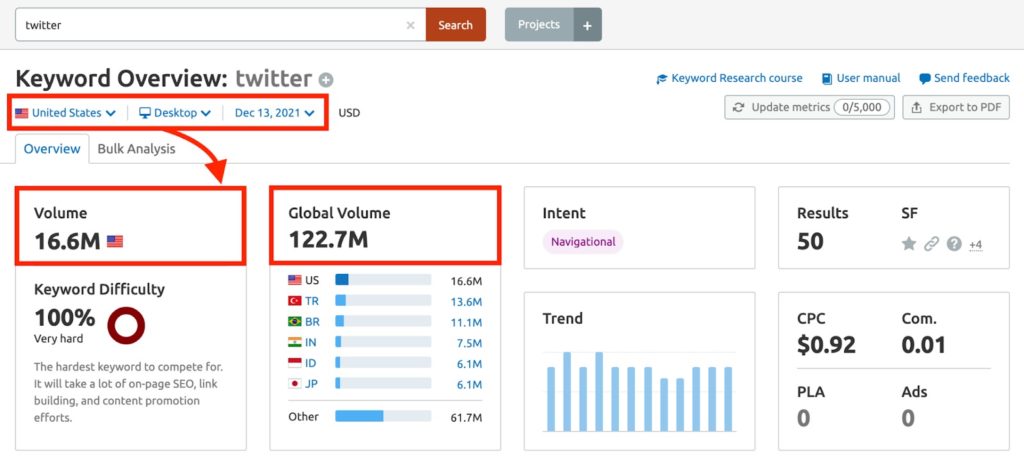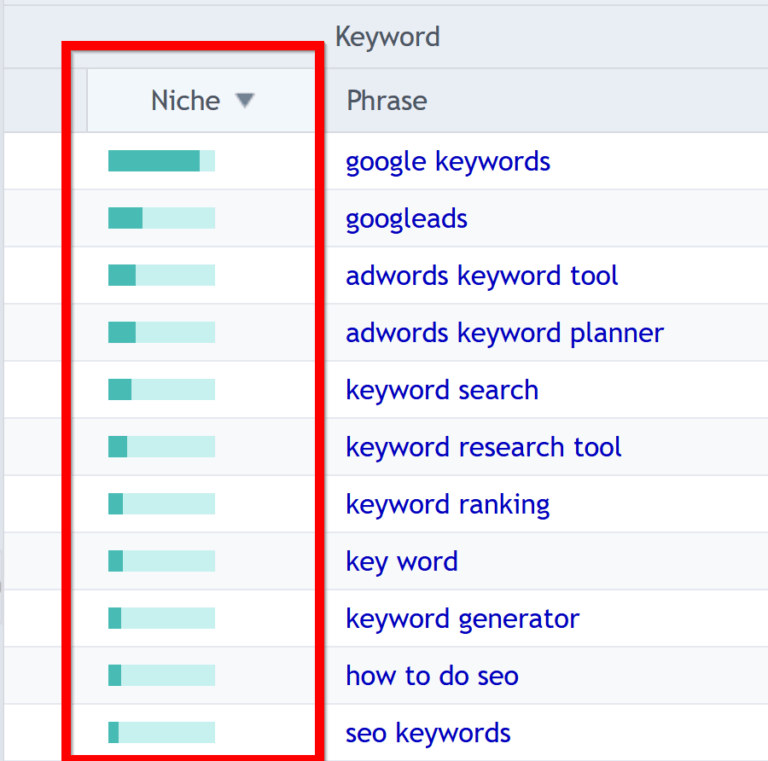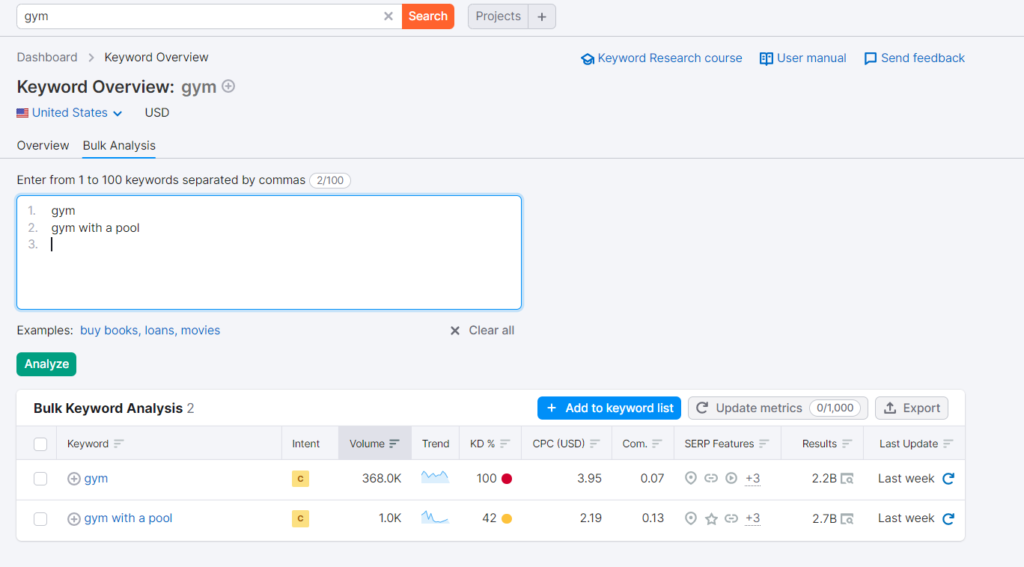The essence of a great website creation lies in content strategy and a list of keywords used to make the website searchable and easily accessible.
Let us be clear, everyone wants their content to rank on the first page of every search engine, especially Google- the higher the ranking, the better.
Therefore, to do so, it is essential to curate a website that targets both, the search engines as well as the users. This is because one without the other would compromise the website's ranking and ROI.
So, to accentuate a failproof SEO (Search Engine Optimization) and get organic traffic, you need to work on its foundation- keyword research.
Worry not; if you are having trouble with the keyword research process, we are here to help rank your business site rank higher. After reading this guide, you'll never need to ask how to do keyword research for your website.
Terms like search volume, long-tail keywords, target keywords, SEO strategy, etc., might confuse you while working on the keyword ideas. However, all of these terms are intertwined with keyword research and allow you to create the type of content you want.
To create a website that is attractive and user-friendly with more organic traffic , take a step back and learn the basics of SEO keyword research.

The keyword research process allows you to create a list of the most popular keywords (or search terms) that the audience usually looks for on search engines such as Google.
However, the relevant keywords need to be included in the content strategically and according to the search volume- the frequency of any particular keyword.
In doing so, you enable your content and website to rank higher on SERP- search engine results page.
In simpler words, a well-crafted keyword research list allows you to understand the language and mindset of the potential customers when they are searching for particular things.
Once you have your traffic generating keyword list, you can easily analyze, compare and even improve the relevant keywords based on the statistics and monthly search volume.
While you are on the "keyword hunt," you would often come across several terms that you need to understand for better results.
These are search terms with considerably low competition levels and search. As the name suggests, they tend to be longer, usually a short phrase with 3 or more words. Long-tail keywords have proven to have more sales conversion rates as they do not have much competition and are easily searchable.
These are what we call the short-tail keywords consisting of only one or two words. They tend to have a higher competition level and high monthly search volume. These keywords have no modifiers.
This metric allows you to evaluate and analyze the number of people searching for a particular keyword or query. Search volume accolades your content with the right and popular keywords, turning the search engines in your website's favor.
Ideally, when performing keyword research you should always target keywords with low search competition levels and a high monthly search volume.

In this digital era, it has become a need for every type and size of business to create an avid online presence. Your website is what you would call in the non-digital world the brick and mortar store. It displays your content, products, and services to the visitors. Understanding how to do keyword research for your website is something that needs to be considered.
The keywords are the linchpin that allows you to understand if your content understands and fulfills the visitor's needs.
Keyword research is critical in defining your website's workability and success.
On-page SEO might be sufficient for local organizations or businesses standing in less competitive industrial markets for its search engine visibility and ranking.
However, for a medium-sized or a large scale B2B or B2C organization, it is important to include other SEO strategies like backlinks, off-page SEO, industries, and keyword-optimized content on other social media platforms like Instagram, and Facebook, Twitter, Yelp, etc.

Consistent and keyword-quality rich content with relevant key terms (short or long-tail) alongside internal and backlinks can enhance the optimization.
Overlooking the competitive keywords and not investing in keyword strategies can cost your time, money, and business. If your website fails to rank on the first page of search engines, nobody is ever going to discover your content, and that would bring the ultimate doom to your business.
Your content should not be focused on what you want to tell the people but on what the people want to know and discover.
After you have grasped the basics of keyword research, it will allow you to:
You must understand the intent of keyword research and learn the different types of keywords. If you get stuck with the process, you can always seek help from SEO experts or other relevant keyword tools for searching.

When working with SEO and keyword research, you cannot overlook the factor of "search intent or user intent." Identifying user indent is the most important factor of keyword research and will help get you in front of the competitors which will help you understand how to do keyword research for your website.
Using intent when doing keyword research targets the main goal every user has when they search for anything particular or a query on any search engine.
To create a failproof content marketing strategy and run a successful business online, the importance of search intent can never be stressed enough. Search intent lends you the perfect keywords that become the driving force for your content and marketing strategy.
Creating your website based on the search intent allows your content to be specific and precise; moreover, it navigates more people to your website throughout the various stages of the sales funnel, turning them into potential customers.
To help you understand better, here are the four basic types of search or user keyword intent- so that you do not get lost in the search for potential keywords.
All you have to do is align the goal of keyword research with the search intent and improve your website's ranking.
Now that you know that keyword research is as important to your online existence as oxygen is to your physical existence. You must learn the tips to hunt down the exact keywords for your SEO.
Here are a few keyword research ideas that will help you create an unbeatable website:
Every business has different goals and targets a different audience. Therefore, to kickstart your keyword hunt, you must create a list of business-oriented topics and decide how to rank them accordingly.
You can use "seed terms or seed keywords" to narrow down your research for specific niches. A seed term is the main keyword you can type into the SEO tools or search engines to generate a list of relevant terms or keywords.

While creating the topics, it is important to embrace the customer or buyer personas and then equate them to your sales conversions. Write down the content topics and then list down their keywords with the monthly search volume.
For example, if you are a footwear company. you may have a bucket list for the topics like:
The search volume enables you to gauge the relevancy and importance of these topics as per your target audience. Furthermore, if the list of organic keywords for any topic increases, it will help you create relevant sub-topics- as they say, the more, the merrier.

Happy with your content topics? It is time to move on to the next important step- adding relevant keywords to each topic.
They can range from a single word to an entire keyword phrase to enable the content to rank higher on SERPs. It will also allow you to get the "additional keyword ideas" if your potential customer searches for specific terms.
For instance, if we go back to the topic we listed above, you would need to brainstorm keywords related to the "footwear" topic. Such as:
Initially, it would be best to dump all the keyword phrases you and your content or social media marketing team can come up with under each topic. And later, you can narrow them down based on the level of competition and keyword difficulty.
As the internet advances and more people are getting comfortable with the digital paradigm, Google is encrypting more and more keywords every day. This way, it becomes easier to know what keywords the audience is typing in the search engines to find you.
However, to utilize this smart feature, you will have to get access to certain Traffic Analytics tools like HubSpot Sources or Google Analytics. All you need to do is, look for your content topic, drill down the monthly traffic on your website and identify the keywords that visitors are using to look up for your website.

You will be amazed to learn how a single keyword can have different meanings as perceived by different people. You have to amalgamate your keyword research with the user intent to improvise your Google ranking and gain more organic traffic.
Before doing any of this, analyze and interpret every keyword in your list. For instance, if your keyword phrase is "the best way to start a blog," here, "blog" can be interpreted in several ways. You can mean blog website or simply a blog post, and the user intent will decide that.
If the searcher wants to launch a website or start blogging, they will use the search engines accordingly. SO, if you are, let us say, targeting the former, you would use the user intent to create content based on keywords for starting or launching a website.
The easiest way to verify that you are on the right track with intent and keyword research is by typing the keywords in the search engines and analyzing the results that pop up.
Keyword research allows you to perceive the prospects of the audience relative to your business, services, and products. If you know what your target audience wants, there will be no trouble creating useful and lucrative content that caters to their needs and demands.
Remember, the key to success does not solely lie in the perfect keywords you find for your content but also in the content management strategy - how you execute those keywords in your SEO-optimized content.
Pay-per-click or PPC campaigns like Google Ads allow people to find your website via organic search.
You should enlist specific keywords relevant to your business goals and align them with your services for better sales conversion and user engagement.
PPC campaigns and online advertising enable you to utilize keyword research for several purposes.
You can easily get stuck with all the keyword research chaos. Worry not; there are several handy keyword and SEO tools that can assist you with excellent keywords ideas and find the perfect match.
To stand above the competition level, here are some easy-to-use tools:
These tips and tools can help you with the SEO ranking of your website and enable you to put your business upfront on various online platforms.
When creating a website and struggling with keyword research and SEO, you want to avoid some easy-to-miss pitfalls.
Here are some keyword mistakes you need to avoid at all costs:

People often miss out on keyword research as they believe it holds no importance for their website- the biggest mistake ever. Even though keyword research can be daunting and take up a lot of time, it is the only way to improve SEO and rank your website higher on search engines like Google.
You cannot just "instinctively" anticipate what your users want; the only way to understand their needs and mindset is to use the words alongside the search intent.
Also, it is essential that with time you change update or change your keywords strategy and list if your audience or business needs changes.
Targeting realistic and relevant keywords is crucial while following the keyword trends. Some niches or content types are hard to rank and very competitive, so if you are just a beginner, you need to focus more on the "long-tail" keywords and not the competitive keywords.
How to do keyword research for your website should help you nail down the competition. This will ensure you don't go after keywords that are too difficult to rank for.

You can easily make the mistake of using low-difficulty keywords or exact keywords only to get higher traffic.
When you write a great article, you cannot rank it based on only one exact keyword or go for low-difficulty phrases to ease your work. You need to create keyword-optimized content to become discoverable on search engines and gain more traffic.
Furthermore, you can seek assistance from SEO tools like the Rank Math Premium plugin to find focus and key terms.
If you opt for keyword cannibalization (optimizing the same keyword for various pages), you will be creating obstacles to your website's success.
The same keyword on more than on-page will confuse the search engines, and they will not know which page to show to your users- leading to complete disaster. Therefore, if you want to create multiple pages, you must create a separate keyword list.

You have done your keyword part, and your website is up and running. However, to see if your ranked keywords are serving their purpose, it is important to evaluate your monthly stats to analyze if people are able to find your content easily.
The easiest way to do this is to Google your main keywords often or use a private browser (that would be better) to see where your article shows up in the results.
This will allow you to decide whether you want to stick with the long-tail keywords or are ready to go with the competitive "head" keywords.
It is never easy to run a business, especially if you do it online.
The best way to get more visitors to your website and increase sales conversions is to do your keyword research for SEO right. It is a time-consuming and tiring process, but you can enjoy the benefits in the long run when done right.
More keywords ranked will translate to more willing customers and lead to your success. I hope you've enjoyed how to do keyword research for your website.